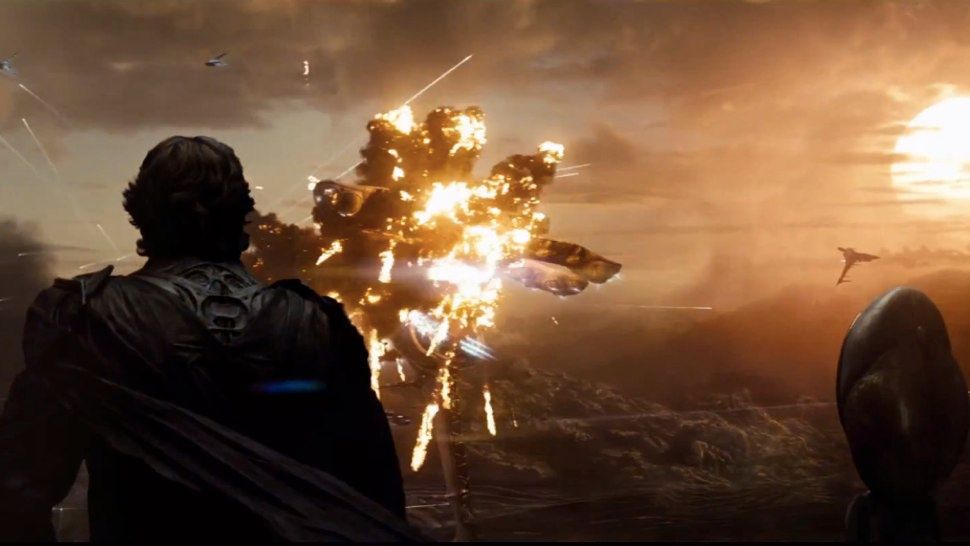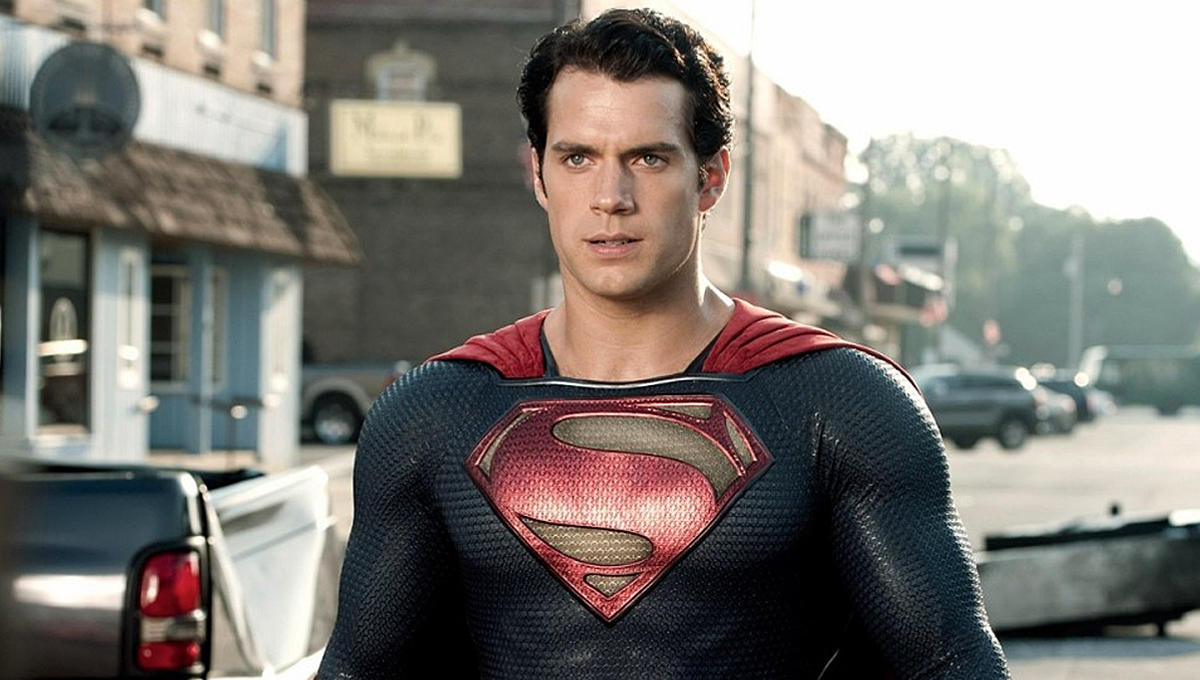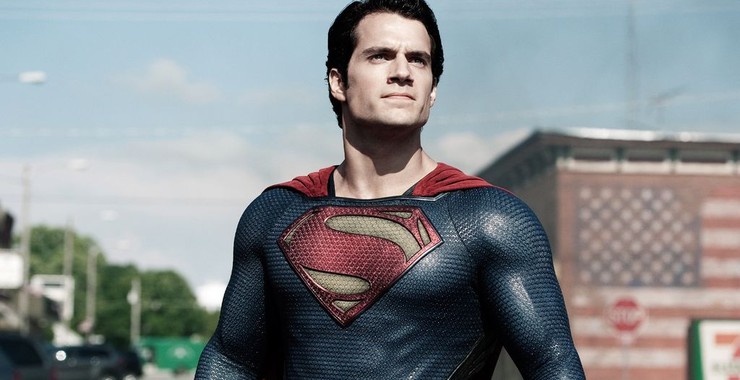Spoilers in paragraphs 1 and 2 for Black Adam
At the red carpet premiere for Black Adam on October 12th, star Dwayne Johnson was trying very hard not to spoil the big surprise of his upcoming DC passion project. But like a kid in the candy store, he couldn’t help himself. When asked about the rumours around him securing the return of Henry Cavill as Superman to the DCEU, both in Black Adam and beyond, Johnson merely said “welcome home”. Days later, news broke that Warner Bros.’ old leadership had been actively denying the return of Henry Cavill as Superman, but thanks to the merger with Discovery, the door opened for such a return.
Now with Man of Steel 2 in development and searching for writers, I thought it would be a good time to look back on the first Man of Steel film, to figure out why fans are so excited for his return, what worked in the movie, and what didn’t. This will wrap up my reviews of the Snyder trilogy, which includes Batman v Superman (and its director’s cut) and Zack Snyder’s Justice League.
The teaser above, which still sends chills through my body, is an exceptional teaser that showcased the potential of the film. But I’ll be the first to admit it, I think Man of Steel is a wildly inconsistent movie. It has moments of greatness but it’s also an exhausting film to watch. The final act, which is dedicated almost entirely to a large-scale battle with an absurd amount of collateral damage and the infamous neck snap, is frankly a bore to watch, despite all the action. Seriously, this movie has dudes punching other dudes through skyscrapers, over the distance of many city blocks, and it’s a snooze that goes on for far too long. While this first impression was decidedly uneven, Man of Steel’s sequels would make him either a dark brooding co-star with a limited character arc, or have him be absent for almost the entirety of the runtime (Batman v Superman and Justice League, respectively).

So despite this limited and inconsistent screen time, fans love Henry Cavill as Superman and this started with Man of Steel. The film was designed to be a re-imagining of sorts for the character, one that took the gritty serious approach from Nolan’s Batman trilogy (Nolan served as a producer on the film). Gone was both the boy scout optimism found in the Christopher Reeves and Brandon Routh films (and Tom Welling’s portrayal in Smallville) and the underwear that was outside the tights, in favour of a dark, gritty reimagining of the iconic character.
Where Man of Steel Misses Expectations
Clark Kent opens up the movie as a drifter, unsure of his place in the world, much like Bruce Wayne did at the opening of Batman Begins. These quieter parts are, ironically, the strongest part of this Superman film, offering a bit more exploration into a figure who is a product of two worlds, but a member of none. But Man of Steel never reaches the nuance or pedigree that Christopher Nolan’s first Batman film does. A darker, uncertain Superman isn’t a bad idea either, but it has to have a payoff and I don’t think Man of Steel found the light by the time the credits rolled (or by the time Batman v Superman’s credits rolled for that matter.)
Man of Steel opens up with a rather extended prologue on Krypton and showcases the demise of the planet. We get introduced to Kryptonian society briefly, and the crisis at hand, as well as the coup initiated by General Zodd (Michael Shannon). I feel like this scene is ultimately there for the fans of the comics, as you can cut it and not much changes in terms of narrative. Zodd opens the film looking to instigate a revolution and needs a codex to complete his task, but this information is given to the audience once more later on in the movie, so the introduction is more there as set dressing rather than being entirely crucial to the plot.

After the intro, we head into the part of the film I touched up already, with Clark Kent as a narrative driver. Despite not being a beacon of hope, I like that Superman had some inner conflict about his place in the world. Is he a symbol of hope or fear, should he inspire and lead or leave humanity to their own devices. Both of these ideologies stem from his fathers, Jor-El (Russell Crowe) and Jonathan Kent (Kevin Costner). The film is told with extensive use of flashbacks to Clark’s youth as various crises and events shape the young hero-to-be. I would be curious to see a cut of this film told in a linear fashion, just to see if it would work better.
One flashback, though, drops the ball in a big way when it comes to the characterization of Clark and that’s the death of Jonathan Kent. In Man of Steel, he dies in a tornado, the implication being that Clark could save him in a blink of an eye but it would risk exposing him to the masses. Considering he can move faster than a speeding bullet, I’m calling shennanigans. In the Christopher Reeves version, Pa Kent dies of cancer, illustrating that for all his power, Superman can’t play God.
Where Man of Steel Succeeds
The cinematography in this earlier half of the film is quite nice, with lots of close-ups of nature and a muted colour pallet to represent the absence of hope. Hans Zimmer’s score builds up to an epic and inspiring theme, but is built on the foundations of a humble and sincere piano melody. Superhero film scores tend to be forgettable, but Man of Steel’s soundtrack is one of the few that actually rises above its contemporaries as an exceptional film score.
Henry Cavill’s co-stars are all pretty good, considering the material they’re given. Russell Crowe as Jor-El is probably the highlight of the film, delivering a wise and cool interpretation of Clark’s biological father from beyond the grave. Amy Adams and Laurence Fishburne are fine as Lois Lane and Perry White, respectively, while Shannon’s Zod’s out to save his people in a terribly misguided way. I don’t think he was scary enough, considering his genocidal warpath, but on paper, one understands where he’s coming from. Kevin Costner and Diane Lane round out the cast and Pa Kent and Martha Kent, who guide the young Clark and encourage him to hide his powers, for fear that the world will shun him and fear him. Considering how quick we are to judge and hate things that are different these days, one can understand where they’re coming from.
Where Henry Cavill Falters
Henry Cavill’s Superman here is a little rough around the edges. I will be the first to admit that he certainly grows into the role by the time Justice League rolls around and he finds that balance of optimism and wise leader. In Man of Steel, he’s on a path of discovery, but he comes across as stiff and far too stoic to make him compelling. There’s also the infamous neck snap, which was a huge point of contention for fans of the character, as it was seen as a violation of the character’s core ethos. So while I find it hard to recommend Man of Steel, I will say I’m at least intrigued by the prospect of a sequel, as Cavill has matured as an actor since 2013 and hasn’t been given the chance to really explore the character yet.
Man of Steel is really the film that allowed Cavill to explore Superman the most, so I’ve often wondered why the fandom was so enamoured by his rendition of the Man of Steel. Sure, this is physically the strongest we’ve seen him on screen, probably ever up until that point. We also got to see him in an actual clash of titans, but what about the character?

I don’t think Cavill hit the same heights as his predecessors, yet there are those who will passionately defend Cavill’s interpretation as the best version of Superman there is. Perhaps looks and physique play a role in this, he certainly embodies the character, but he didn’t capture the spirit of Superman. But I also think more of the blame for this issue falls on director Zack Snyder, and not on Cavill. Snyder has often been criticized of being style over substance and I have mixed feelings about his filmography. I feel he finally hit his stride with his cut of Justice League, with Cavill also coming into his own after some uneven efforts prior.
Henry Cavill’s ‘Man of Steel’ Super-Fans & Super Critics
But why do fans of Cavill’s Superman defend him so fervently? There are those who will die on the hill claiming that his Superman is the definitive Superman, and it’s a statement that I simply don’t understand. We just haven’t seen enough of him being Superman.
Empire Online, who placed Man of Steel as the 284th film on a list in 2014, made a ranking of all the actors playing Superman on film and television, and placed Henry Cavill as number two out of twelve, citing “The idea of a dark Superman seemed anathema to the character’s entire history and ethos, but the fundamental point of Man of Steel was that he wasn’t Superman yet; Cavill deftly playing an alien coming to grips both with his powers and his place in a world that’s not his own.” The Washington Post also echoed similar praise, stating that “Other than Christopher Reeve himself, no actor has embodied the image of Superman in live-action quite like Cavill has. He gives off a commanding and calm presence that seems to have leaped in a single bound from the comic book page to the big screen. Think casting Iron Man with Robert Downey Jr., but sub in a guy who works his triceps to failure and doesn’t skip leg day.”
In contrast, Richard Roeper stated that Cavill’s performance was “a bit of a stiff on screen” while CNET would state that “The scenes between Russell Crowe’s Jor-El and Michael Shannon’s glassy-eyed Zod crackle with tension and drama that the scenes with Henry Cavill’s Superman just can’t match.”

But some harder criticism of the movie comes from comicbook artists Grant Morrison and Neal Adams. Morrison stated “I’m not sure about the killing thing. I don’t want to sound like some fuddy-duddy Silver Age apologist but I’ve noticed a lot recently of people saying Batman should kill the Joker and, yeah, Superman should kill, he should make the tough moral decisions we all have to make every day. I don’t know about you, but the last moral decision I made didn’t have anything to do with killing people. And I don’t think many of us ever have to make the decision whether or not to kill. In fact, the more you think about it, unless you’re in one of the Armed Forces, killing is illegal and immoral. Why would we want our superheroes to do that?“
Neal Adams would be far more critical of the film, stating: “And then at the end, what did he do? He killed a guy. Can’t he put his hand over his eyes? I’m just saying put your hand over his eyes. That would stop it pretty much. One arm is around the throat, put the other hand in front of his eyes. That’s pretty much it. Take him off to the moon or Saudi Arabia or someplace, and finish the battle there.“
Is Man of Steel Worth It?
In the end, I think Man of Steel is an adequate film but nothing that is worthy of high praise. It has some interesting ideas about responsibility and hope while telling an interesting origin story for one of the most iconic superheroes of all time. But it also stumbles and falls along the way and completely loses me in the final showdown, which takes roughly forty-five minutes to complete and ultimately amounts to CGI figures punching each other through buildings over and over again.

Even then, over the course of this movie and its two sequels, I don’t think Henry Cavill had the opportunity to really dive into the Superman character. We’ve seen the arc of him going from a brooding reclusive hero to a symbol of hope, but we haven’t seen him explore what it’s like being a symbol yet. So with that in mind, I’m not the biggest fan of Man of Steel…but am at least, quite interested in its overdue sequel.
Do you prefer Henry Cavill’s take on Superman?
Henry Cavill has had a rocky time during his tenure as Superman, but now that he’s back, we’re curious if you’re a fan of his take on the Man of Steel, what you’d like to see from him in the future and who should direct Man of Steel 2?

4 thoughts on “A Look At ‘Man of Steel’ and Henry Cavill’s Flawed Superman- ScreenHub Entertainment”